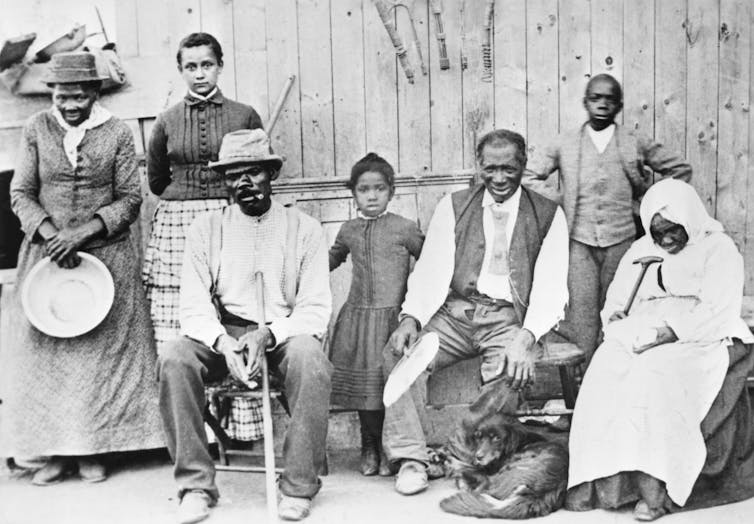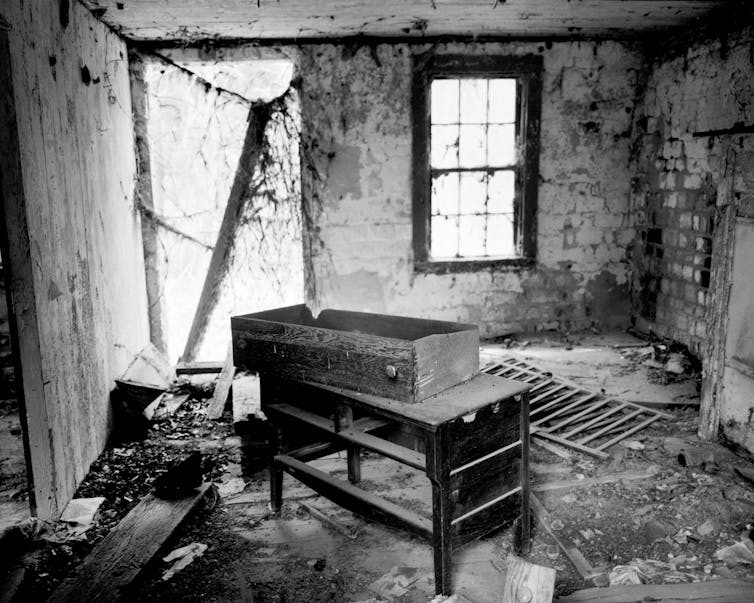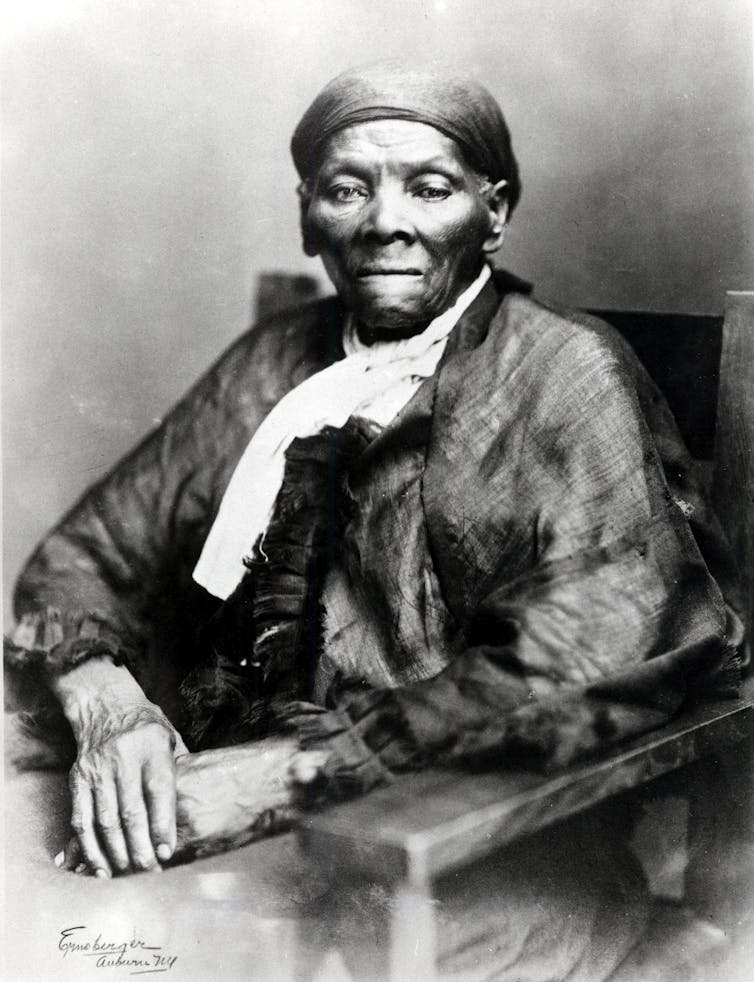Harriet Tubman was barely 5 ft tall and didn’t have a dime to her identify.
What she did have was a deep religion and highly effective ardour for justice that was fueled by a community of Black and white abolitionists decided to finish slavery in America.
“I had reasoned this out in my thoughts,” Tubman as soon as informed an interviewer. “There was considered one of two issues I had a proper to, liberty, or loss of life. If I couldn’t have one, I might have the opposite; for no man ought to take me alive.”
Although Tubman is most well-known for her successes alongside the Underground Railroad, her actions as a Civil Struggle spy are much less well-known.
As a biographer of Tubman, I feel it is a disgrace. Her devotion to America and its promise of freedom endured regardless of struggling many years of enslavement and second class citizenship.
It’s only in fashionable occasions that her life is receiving the renown it deserves, most notably her likeness showing on a US$20 invoice in 2030. The Harriet Tubman $20 invoice will substitute the present one that includes a portrait of U.S. President Andrew Jackson.
In one other recognition, Tubman was accepted in June 2021 to the US Military Navy Intelligence Corps Corridor of Fame at Fort Huachuca, Arizona. She is considered one of 278 members, 17 of whom are girls, honored for his or her particular operations management and intelligence work.
Although conventional accolades escaped Tubman for many of her life, she did obtain an honor often reserved for white officers on the Civil Struggle battlefield.
After she led a profitable raid of a Accomplice outpost in South Carolina that noticed 750 Black folks rescued from slavery, a white commanding officer fetched a pitcher of water for Tubman as she remained seated at a desk.
A special schooling
Believed to have been born in March 1822 in Dorchester County, Maryland, Tubman was named Araminta by her enslaved mother and father, Rit and Ben Ross.
“Minty” was the fifth of 9 Ross youngsters. She was regularly separated from her household by her white enslaver, Edward Brodess, who began leasing her to white neighbors when she was simply 6 years previous.
At their palms, she endured bodily abuse, harsh labor, poor diet and intense loneliness.
As I discovered throughout my analysis into Tubman’s life, her schooling didn’t occur in a conventional classroom, however as an alternative was crafted from the grime. She discovered to learn the pure world – forests and fields, rivers and marshes, the clouds and stars.
She discovered to stroll silently throughout fields and thru the woods at evening with no lights to information her. She foraged for meals and discovered a botanist’s and chemist’s data of edible and toxic crops – and people most helpful for substances in medical remedies.
She couldn’t swim, and that pressured her to study the methods of rivers and streams – their depths, currents and traps.
She studied folks, discovered their habits, watched their actions – all with out being observed. Most necessary, she additionally discovered methods to distinguish character. Her survival relied on her capability to recollect each element.
After a mind damage left her with recurring seizures, she was nonetheless in a position to work at jobs usually reserved for males. She toiled on the transport docks and discovered the key communication and transportation networks of Black mariners.
Generally known as Black Jacks, these males traveled all through the Chesapeake Bay and the Atlantic seaboard. With them, she studied the evening sky and the position and motion of the constellations.
She used all these expertise to navigate on the water and land.
“… and I prayed to God,” she informed one good friend, “to make me sturdy and in a position to battle, and that’s what I’ve at all times prayed for ever since.”
Tubman was clear on her mission. “I ought to battle for my liberty,” she informed an admirer, “so long as my power lasted.”
The Moses of the Underground Railroad
Within the fall of 1849, when she was about to be offered away from her household and free husband John Tubman, she fled Maryland to freedom in Philadelphia.
Between 1850 and 1860, she returned to the Japanese Shore of Maryland about 13 occasions and efficiently rescued almost 70 family and friends members, all of whom had been enslaved. It was a rare feat given the perils of the 1850 Slave Fugitive Act, which enabled anybody to seize and return any Black man or girl, no matter authorized standing, to slavery.
These management qualities and survival expertise earned her the nickname “Moses” due to her work on the Underground Railroad, the interracial community of abolitionists who enabled Black folks to flee from slavery within the South to freedom within the North and Canada.

Because of this, she attracted influential abolitionists and politicians who had been struck by her braveness and resolve – males like William Lloyd Garrison, John Brown and Frederick Douglass. Susan B. Anthony, one of many world’s main activists for girls’s equal rights, additionally knew of Tubman, as did abolitionist Lucretia Mott and ladies’s rights activist Amy Submit.
“I used to be the conductor of the Underground Railroad for eight years,” Tubman as soon as mentioned. “and I can say what most conductors can’t say; I by no means ran my prepare off the monitor and I by no means misplaced a passenger.”
Battlefield soldier
When the Civil Struggle began within the spring of 1861, Tubman put apart her battle towards slavery to conduct fight as a soldier and spy for the US Military. She supplied her companies to a robust politician.
Identified for his marketing campaign to kind the all-Black 54th and fifty fifth regiments, Massachusetts Gov. John Andrew admired Tubman and thought she can be an excellent intelligence asset for the Union forces.
He organized for her to go to Beaufort, South Carolina, to work with Military officers in control of the lately captured Hilton Head District.
There, she offered nursing care to troopers and lots of of newly liberated individuals who crowded Union camps. Tubman’s ability curing troopers laid low with quite a lot of illnesses turned legendary.
However it was her army service of spying and scouting behind Accomplice strains that earned her the best reward.
She recruited eight males and collectively they skillfully infiltrated enemy territory. Tubman made contact with native enslaved individuals who secretly shared their data of Accomplice actions and plans.
Cautious of white Union troopers, many native African Individuals trusted and revered Tubman.
Based on George Garrison, a second lieutenant with the fifty fifth Massachusetts Regiment, Tubman secured “extra intelligence from them than anyone else.”
In early June 1863, she turned the primary girl in U.S. historical past to command an armed army raid when she guided Col. James Montgomery and his 2nd South Carolina Coloured Volunteers Regiment alongside the Combahee River.

Whereas there, they routed Accomplice outposts, destroyed shops of cotton, meals and weapons – and liberated over 750 enslaved folks.
The Union victory was broadly celebrated. Newspapers from Boston to Wisconsin reported on the river assault by Montgomery and his Black regiment, noting Tubman’s necessary position because the “Black she Moses … who led the raid, and underneath whose inspiration it was originated and carried out.”
Ten days after the profitable assault, radical abolitionist and soldier Francis Jackson Merriam witnessed Maj. Gen. David Hunter, commander of the Hilton Head district, “go and fetch a pitcher of water and stand ready with it in his hand whereas a black girl drank, as if he had been considered one of his personal servants.”
In that letter to Gov. Andrew, Merriam added, “that girl was Harriet Tubman.”
Lifelong battle
Regardless of incomes commendations as a useful scout and soldier, Tubman nonetheless confronted the racism and sexism of America after the Civil Struggle.

When she sought fee for her service as a spy, the U.S. Congress denied her declare. It paid the eight Black male scouts, however not her.
Not like the Union officers who knew her, the congressmen didn’t imagine – they might not think about – that she had served her nation like the lads underneath her command, as a result of she was a lady.
Gen. Rufus Saxton wrote that he bore “witness to the worth of her companies… She was employed within the Hospitals and as a spy [and] made many a raid contained in the enemy’s strains displaying outstanding braveness, zeal and constancy.”
Thirty years later, in 1899, Congress awarded her a pension for her service as a Civil Struggle nurse, however not as a soldier spy.
When she died from pneumonia on March 10, 1913, she was believed to have been 91 years previous and had been preventing for gender equality and the correct to vote as a free Black girl for greater than 50 years after her work in the course of the Civil Struggle.
Surrounded by family and friends, the deeply spiritual Tubman confirmed one final signal of management, telling them: “I am going to arrange a spot for you.”![]()
Kate Clifford Larson, Professor of Historical past, Brandeis College
This text is republished from The Dialog underneath a Artistic Commons license. Learn the authentic article.